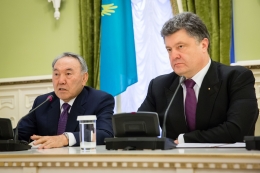Astana Strives to Resolve Ukraine Conflict
By Richard Weitz (01/22/2015 issue of the CACI Analyst)
Kazakhstan stands out in Central Asia and the South Caucasus for its government’s activist diplomacy directed at building institutions, promoting disarmament, and reducing Eurasian conflicts. Astana has sought to ban nuclear tests globally and extend confidence-building mechanisms throughout Asia, and Kazakhstan’s past conflict resolution efforts have addressed Iran, water disputes, and Afghanistan. Kazakhstan’s current mediation effort concerns the Ukraine conflict. Kazakhstan’s recurring challenge, which may disrupt its Ukrainian efforts, is that its ability to resolve disputes is limited in the absence of supporting partners.

Yerevan and Ankara Exchange Messages
By Erik Davtyan (10/01/2014 issue of the CACI Analyst)
In late August and early September, Armenia and Turkey entered a short period of activated bilateral relations that was generally stipulated by Armenia’s participation in Recep Tayyip Erdoğan’s inauguration and an exchange of messages between foreign ministries of the two countries.
On August 28, Armenia’s Minister of Foreign Affairs Edward Nalbandian attended Erdoğan’s inauguration in Ankara. During his meeting with representatives of Armenia’s youth on August 24, Armenia’s President Serzh Sargsyan had already announced the official invitation from the Turkish side, adding that “the participation will probably be at the level of Foreign Minister.” The last meeting between Armenian and Turkish Foreign Ministers took place on December 12, 2013, in Yerevan within the framework of the 29th meeting of the Council of Ministers of Foreign Affairs of the Organization of the Black Sea Economic Cooperation. The Armenian delegation’s presence during the Ankara event received considerable attention and public scrutiny in Armenia. Nalbandian’s visit to Turkey took place on the eve of preparatory works for the Centennial of the Armenian Genocide.
During a meeting with students of Yerevan State University on September 1, Nalbandian described the visit as an opportunity to hand Erdoğan an official invitation from President Sargsyan to attend the commemoration ceremony of the Armenian Genocide Centennial, which will take place on April 24, 2015 in Yerevan. In an article published in the French newspaper Le Figaro, Nalbandian stated that “Turkey should reconcile with its own past,” hoping that Armenia’s official invitation “will not be a missed opportunity and that Turkey’s President will be in Yerevan on that day.” Armenian authorities perceive the visit to Ankara as a necessary step towards establishing a firm dialogue between the two states.
Nalbandian’s was highly controversial in Armenia, demonstrating that Armenian-Turkish relations constitute one of the most debated issues in Armenia’s foreign policy. The Prosperous Armenia party argues that since Armenia has no diplomatic relations with Turkey, the country should not send representation at the level of the Foreign Minister. Speaking on behalf of the Armenian Revolutionary Federation, Giro Manoyan stated that Nalbandian’s visit to Ankara was unwarranted due to Erdoğan’s strictly anti-Armenian statements during his recent electoral campaign in Turkey. Sharing the same view, the vice-president of the Armenian National Congress party, Levon Zurabyan, stated that “this gesture is intended to start a diplomatic process with Turkey,” leading to the implementation of the Zurich protocols signed by the Armenian and Turkish Foreign Ministers in 2009.
Nevertheless, some Armenian analysts believe that the visit was a positive step. The vice-president of the Caucasus Institute, Sergey Minasyan, says the visit indicated that the “Armenian side proved that Armenia is ready to launch initiatives in Armenian-Turkish relations.” Commenting on Armenia’s participation in Erdoğan’s inauguration, turkologist Vahram Ter-Matevosyan shares the viewpoint that Armenia needs to open its border with Turkey, hence any steps that do not damage Armenia’s national interests and national security should be taken to change the situation.
The reactivation of relations between Armenia and Turkey was also stipulated by statements given by Turkey’s new Minister of Foreign Affairs, Mevlüt Çavuşoğlu, shortly after the formation of the new government headed by Ahmet Davutoğlu. On September 1, in an interview to Azerbaijan Press Agency (APA), Çavuşoğlu said that Turkey and Azerbaijan “will unite their efforts and forces in all issues,” underlining that Turkey “will fight together with fraternal Azerbaijan against the so-called Armenian Genocide.” Shortly after the appointment, the Turkish Foreign Minister blamed Armenia for the failure to reestablish Armenian-Turkish relations, which obtained a corresponding reaction from Armenian officials. Appearing on Arajin News in Armenian Public Television on September 10, Armenia’s Deputy Foreign Minister Shavarsh Kocharyan stated that “Turkey consistently implements a policy of denial regarding the Armenian Genocide and continuously makes failed attempts to deny and falsify historical facts. This very approach of the Turkish side continues to be an obstacle to the normalization of Armenian-Turkish relations”.



